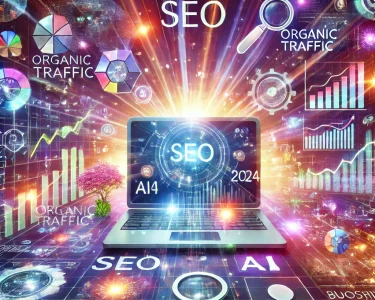Artificial intelligence (AI) is transforming the business-to-business Sales (B2B sales) environment, augmenting human capabilities to help sales teams do more with less. Whether you’re a seasoned sales professional or just stepping into the world of B2B, you can use AI to enhance customer interactions, streamline business processes, and ultimately drive revenue growth.
From lead qualification to personalized engagement and predictive analytics, AI is empowering businesses to stay ahead of the curve and maximize revenue. Here’s what you need to know.

Importance and Benefits of AI in B2B Sales
AI offers a wide range of benefits that reshape the way businesses operate and improve their overall efficiency. AI companies have developed technologies and software that enable salespeople to analyze vast amounts of data, automate repetitive tasks, and generate valuable insights.
Enhanced Efficiency and Productivity
AI-powered tools automate repetitive and time-consuming tasks, such as lead generation and qualification, data entry, and sending follow-up emails. Sales representatives can free up their time from manual tasks and focus more on building relationships with customers and closing more deals. According to CompTIA, 22 percent of firms are actively pursuing the integration of AI into their products and business workflows.
Improved Customer Experience and Personalization
AI algorithms and technologies, such as natural language processing (NLP) and machine learning, analyze customer data to gain valuable insights into their preferences, behaviors, and pain points. This enables companies to develop customized customer profiles to better understand how to serve and retain them through highly personalized experiences. HubSpot’s 2024 State of Marketing Report reveals that 94 percent of marketers say personalization boosts sales. Personalization helps businesses deliver targeted offers, customized loyalty programs, relevant content, hyper-tagged ad campaigns, and more.
Data-Driven Decision Making
AI-powered analytics provide actionable insights into sales trends, customer behaviors, and market trends. Around 73 percent of sales professionals agree that AI can help them generate insights from data that they can’t find manually. Machine learning models can forecast trends based on historical data, providing businesses with actionable insights. It helps sales and marketing teams to consistently monitor campaign performance, identify high-potential opportunities, and adjust their strategies in real-time to maximize results. AI can also predict future customer behavior and preferences, enabling businesses to know which products, services, or content they should offer at a particular time and through a specific channel.
Optimized Sales Processes
AI frees up more time for sales and marketing teams to focus on improving customer relationships. It can significantly reduce operational costs by automating tasks and improving the efficiency of business processes. Capgemini reveals in a study that 70 percent of consumers say that generative AI will make their work more efficient, freeing them from routine tasks and enabling them to venture out more on the strategic aspects of their jobs. Generative AI makes it easier to create contextually appropriate marketing campaigns, sales presentations, proposals, and promotional materials ideal for a specific customer profile.
Beyond Human: How AI Automates B2B Sales
B2B sales often involve multiple decision-makers, longer sales cycles, and high transaction values. AI helps sales and marketing teams navigate complex workflows and automate repetitive tasks to achieve greater efficiency in their day-to-day processes. This enables them to focus more on building customer relationships and closing deals.
Sales teams can use AI to set up follow-up calls, transcribe notes from audio files, and engage website visitors, while marketers can send emails in bulk or schedule social media posts. Here are some examples of how AI is used to automate B2B sales processes:
- Lead Generation: AI can automate the identification and qualification of potential leads from multiple sources, including social media, websites, landing pages, and email lists.
- Lead Nurturing: AI algorithms can analyze engagement patterns, preferences, and buying histories to help businesses deliver customized content. With AI, reps can send personalized content optimally through the right channel, significantly increasing open rates, click-through rates, and conversions.
- Sales Forecasting: AI’s predictive capabilities help companies analyze historical data and market trends to provide accurate sales forecasts. This helps businesses allocate resources effectively, set realistic targets, and optimize their strategies.
- Data Entry and Administrative Tasks: AI tools can help teams reduce manual data entry, scheduling, and other administrative tasks, which results in fewer errors and better data quality. One example is how AI-based chatbots collect data from various sources in real time and automatically sync the data to a CRM system.
Real-Life Example: HubSpot
For example, HubSpot uses its AI-powered conversational bot ChatSpot to simplify sales and marketing tasks, including creating contacts, sending emails, generating reports, and answering customer queries. According to HubSpot, marketers can save 2.5 hours daily with AI, freeing them up for more strategic and creative tasks.
Data-Driven Insights to Improve Sales Processes
B2B companies can use AI to quickly collect, organize, and analyze data from multiple sources, which is more efficient than doing it manually. Businesses can use various AI techniques, such as machine learning algorithms for extracting patterns from large datasets or deep learning for image recognition or time series analysis.
NLP techniques can also be applied to derive insights from unstructured data to analyze the customers’ underlying desires, needs, and motivations. Data-driven insights help salespeople forecast future sales volumes, trends, purchase likelihood, churn risks, and more.
Reps can use these patterns and correlations from past sales data to launch targeted campaigns to retain customers and drive revenue. Here’s how AI assists companies in making data-driven decisions:
- Predictive Analytics: AI allows businesses to analyze data quickly and generate a solution based on a huge amount of data. AI predictive analytics models can forecast sales outcomes, identify high-potential deals, and determine at-risk customers, letting sales teams prioritize sales efforts and proactively address risks.
- Performance Analysis: B2B companies can use AI tools, algorithms, and real-time monitoring to analyze and forecast competitors effectively. AI-powered reports and dashboards offer real-time visibility into sales performance, so it’s easier for reps to find areas for improvement and increase sales productivity.
- Competitor Analysis: AI tools can gather and analyze data on competitors within minutes, revealing their strengths, weaknesses, and marketing positioning. AI rapidly analyzes competitor product portfolios and other data sources to identify potential opportunities and areas of differentiation.
- Pricing Optimization: AI can recommend optimal pricing strategies and maximize profitability. Advanced AI algorithms and machine learning analyze market data, customer behavior, and competitor pricing from large volumes of customer data and business metrics.
Personalization for Higher-Quality Content at Scale
AI enables businesses to personalize content at scale, delivering customized experiences that resonate with individual customers. It gives marketing campaigns a human touch and allows sales teams to find the best recommendations and reply to customer queries.
AI-powered tools can craft compelling messages, suggest relevant products, and predict customer needs, which drives higher engagement and conversion rates. Here are the different ways AI is used in personalization:
- Content Creation: AI-powered tools can generate personalized emails, social media posts, and product recommendations based on individual customer preferences and behaviors. AI algorithms can also customize website content based on user demographics, browsing history, and interests, providing a more relevant experience.
- Chatbots and Virtual Assistants: These conversational AI technologies can provide instant support and answer customer queries using NLP and generative AI. Customers interact with chatbots via messages and communicate with assistants using voice commands—sales teams typically use virtual assistants for business operations, and customer support teams use chatbots to respond to customer queries.
- Language and Sentiment Analysis: Sentiment analysis tools can analyze customer feedback, social media posts, and reviews using AI and deep learning techniques. Sentiment analysis determines the overall sentiment, opinion, or emotional tone behind the text to address business concerns and improve its products or services.
- Recommendation Engines: AI-powered recommendation engines employ algorithms to predict a user’s choice and offer suggestions for products, services, or content that align with customer preferences.
Major Risks of Adopting AI for B2B Sales
While AI offers a wide range of benefits for B2B sales, it comes with challenges. There are five major risks to consider before implementing AI into your sales strategy.
Overdependence on Automation
AI and generative AI offer many new benefits in B2B sales and marketing, such as automating lead generation and qualification tasks and creating new website content. However, it shouldn’t replace human interaction and creativity entirely.
B2B sales processes often involve complex relationships and many stakeholders, which require human expertise and emotional intelligence. Overdependence on automation might lead to missed opportunities and a transactional sales approach that could alienate potential customers. AI-generated content also poses concerns about the quality and originality of content, and users who accept recommendations without questions can lead to errors.
Poor Data Quality
AI thrives on clean and accurate data, and poor data quality can lead to biased AI predictions and inaccurate insights. Outdated data also fails to reflect current reality, which results in decisions that are based on the past and irrelevant circumstances. This might lead to flawed sales strategies and potentially damage customer relationships.
For instance, Microsoft had to shut down its AI chatbot, Tay, because the bot started sending a series of inappropriate and racist tweets. B2B companies should ensure that their data is well-maintained and up-to-date to prevent similar situations.
The Black Box Problem
Some AI models can be opaque. These so-called “black box models” involve technology that can’t explain itself or why it’s operating the way it is. The black box system’s internal workings and decision-making processes are difficult for humans to understand, which results in a lack of transparency that can be problematic with complex B2B sales scenarios. Sales teams need to understand the rationale behind AI recommendations so they can effectively use them and build trust with their customers.
Single Use-Case Limitation
AI excels at automating specific tasks and pulling insights from data, but there’s a risk of AI being overly specialized for a single task in the B2B sales process. B2B sales cycles often involve long and multiple stages that start from initial lead generation until deal closing. An AI model that’s only designed for a particular task, like lead gen, might not be helpful for the rest of the process.
Additionally, if AI is too focused on a single task, it might miss opportunities to cross-sell, upsell, or identify potential customers. Sales teams should find a balance between using AI tools and human intervention to manage different tasks in the sales process.
Building a Winning B2B Sales Strategy with AI
Integrating AI into your sales strategy provides a competitive advantage to your sales team and empowers them to achieve better results. Three key tips can help you successfully build an AI-powered B2B sales strategy.
Emphasize Personalization in Your Approach
AI can analyze huge amounts of customer data to identify preferences, pain points, and buying histories that serve as the basis for delivering tailored experiences. Sales teams can use these insights to personalize nurturing efforts, from crafting targeted email campaigns to customizing sales pitches.
AI can also be applied to creating personalized and hyper-targeted marketing materials that resonate with each customer’s specific needs. Assess your needs and available resources, and find the best AI tools for your business, including customer data platforms, machine learning algorithms, automation software, personalization engines, and more.
Leverage AI-Powered Analytical Tools
AI-powered analytics and reporting tools can parse through historical data and identify patterns to identify which leads are more likely to convert. It also makes it easier for marketers to deliver personalized experiences by analyzing campaigns, monitoring marketing efforts, and determining opportunities for improvement.
This allows teams to prioritize their efforts and focus on the most promising leads and opportunities. The right analytics and reporting tools can empower teams and businesses to make data-driven and strategic decisions for their sales and marketing efforts.
Put People First, AI Second
While an AI tool can enhance B2B sales processes, it shouldn’t replace human salespeople. AI should be viewed as a powerful tool to automate tasks, providing reps and teams with time to focus on building relationships and closing deals. AI also can’t replicate the emotional intelligence and the ability to understand nuanced situations that are often required in complex B2B sales processes.
Sales teams should use AI insights effectively but also maintain human connections with customers. They should also actively evaluate AI-generated content and recommendations before integrating them into the sales process.
5 Strategies to Conquer AI Integration in B2B Sales
Integrating AI into your sales process can help you drive growth in your business by automating routine tasks, analyzing customer data, and optimizing sales strategies. However, mastering AI technologies requires a strategic approach. Here’s a rundown of the five key strategies to ensure successful AI integration into your sales efforts.
Define Clear Objectives
Before deciding on the AI tools to use, start by setting goals that are specific, measurable, achievable, relevant, and time-bound (SMART). After defining clear objectives, identify the type of content you want to generate, including personalized sales pitches, email campaigns, and product descriptions. It’s also important to determine how you’ll measure the impact of AI-generated content because it allows you to gauge the success of your AI strategy, whether it’s through conversion rates, click-through rates, and more.
Ensure Regulatory Compliance
Gartner predicts that 80 percent of B2B sales interactions will occur through digital channels, transforming the B2B landscape toward a buyer-centric digital model. With this transformation, AI is an indispensable tool for empowering businesses, which also requires stricter regulatory compliance. Businesses should comply with data privacy regulations such as the European Union’s General Data Protection Regulation (GDPR), the AI Act, and the California Consumer Privacy Act (CCPA).
Establish Testing Protocols
Testing new strategies and technologies is among the most important factors in using AI in B2B sales, but you need a systematic approach. Implement a rigorous quality assurance process to ensure that AI-generated content is accurate and aligns with your brand voice. This helps your business or brand maintain a professional image and consistency with your target customer base. You can also implement A/B testing to compare the effectiveness of your content with human-created content to see how you can optimize your sales strategy.
Start Small, Scale Gradually
Start by implementing a pilot program to test AI tools in a controlled, small-scale environment to identify and address potential issues. Once you’re comfortable with using AI technology, gradually expand the use of these tools based on your pilot results. You can customize and scale their application across your operations without leaving your team with a sudden change.
Seamlessly Integrate Your CRM
Integrate it into your existing CRM solution after finding the right AI tool for your business and testing it. Ensure that the AI tool is compatible with your CRM software to easily centralize your data storage and streamline your workflows. While you can integrate AI applications or platforms with your current CRM, you can also choose CRMs with built-in AI features depending on your needs or the resources available.
Bottom Line: The Future of AI in B2B Sales
Implementing AI into your B2B sales processes enhances every facet of your sales cycle, from delivering a personalized customer experience to using predictive analytics and optimizing your workflows. Applying AI to B2B operations helps your sales and marketing teams focus on more strategic and creative pursuits and enables your business to mitigate risks. However, it’s crucial to remember that AI is a tool and not a replacement for salespeople. Find a balance between using AI’s strengths while capitalizing on human expertise to harness the full potential of AI in B2B sales.




